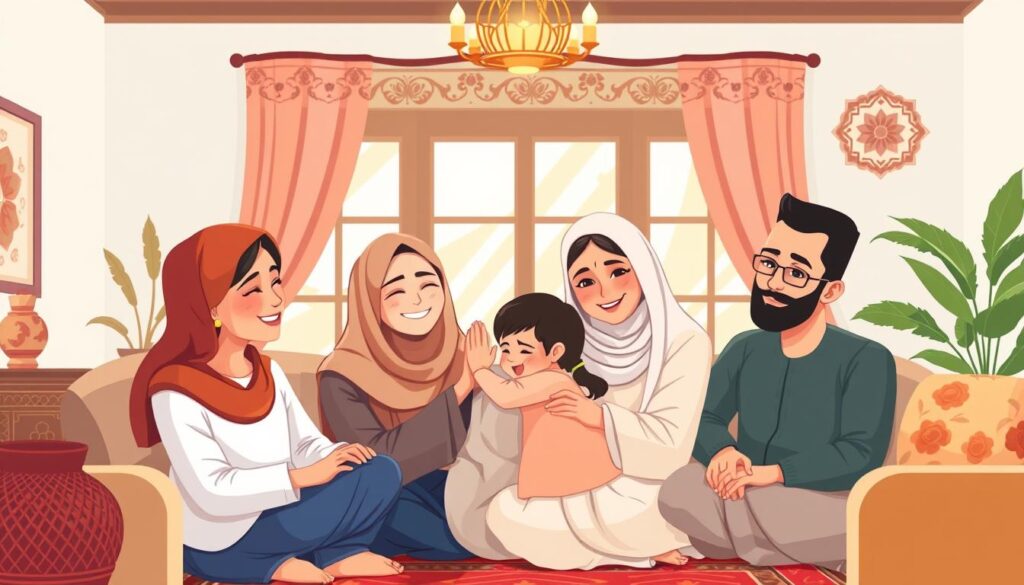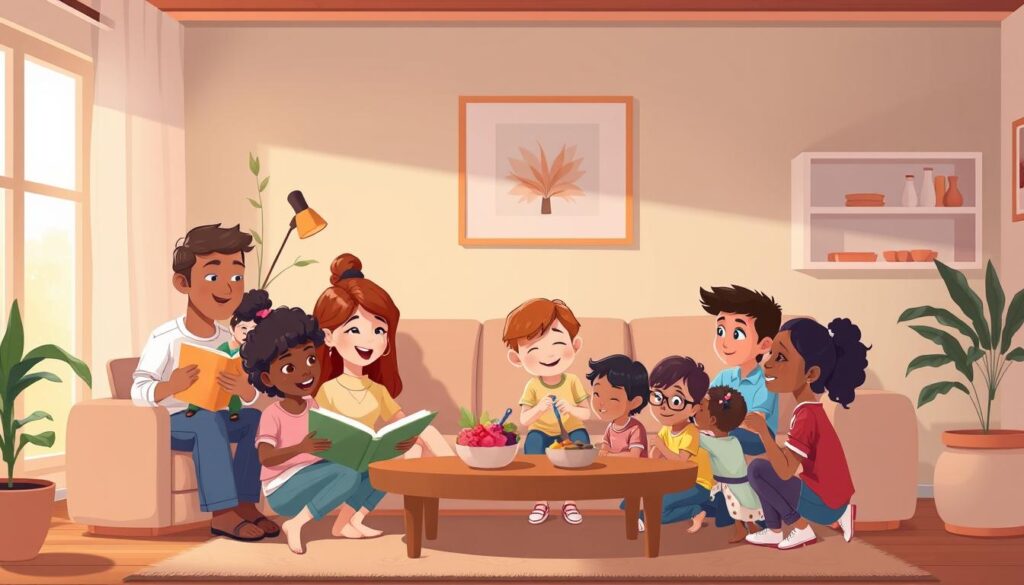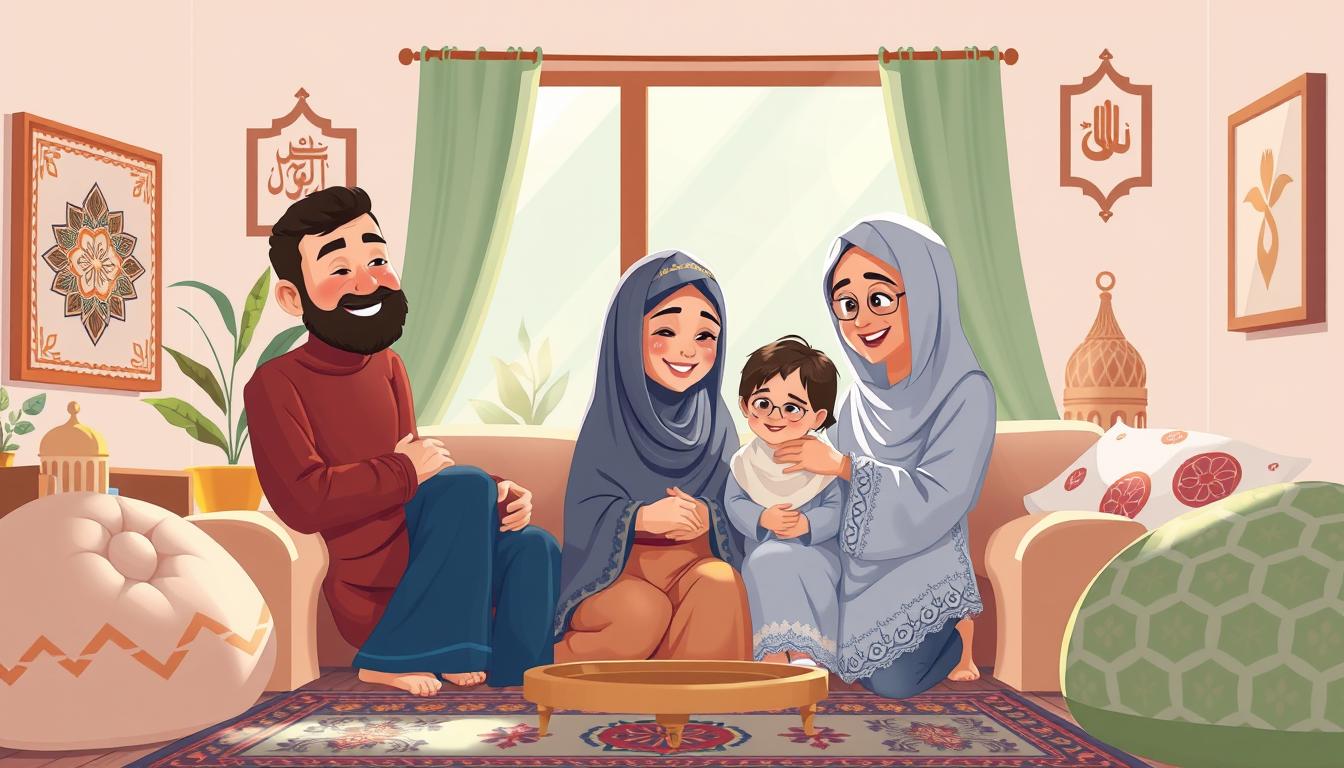We, at Umar Khan Charity Organization, aim to change lives through faith-based work. We focus on Islamic principles. Adoption is a way to show love and care, and it’s seen as a virtuous deed in Islam. It can bring great reward in the Hereafter.
In Islam, fostering a child can make them mahram if the mother breastfeeds them before two. Adoption must follow Shariah guidelines to keep lineage clear.
Exploring Islamic Views on Adoption, we’ll look at the Islamic perspective and the importance of keeping a child’s identity. We’ll also discuss Sharia law’s role in adoption and the challenges Muslim adoptive parents face. This topic is complex, and we aim to give a full understanding of Islamic Views on Adoption.
We want to be a platform for discussion and education on Adoption in Islam. We hope to inspire and empower our readers to help their communities. By diving into Islamic Views on Adoption, we can better understand the need to care for others. Together, we can create a more compassionate world.
Key Takeaways
- Adoption is a virtuous deed in Islam that carries much reward in the Hereafter.
- In Islamic views, fostering a child can make them mahram if the mother breastfeeds them before the age of two.
- Adoption in Islam must adhere to Shariah guidelines to ensure lineage clarity.
- Adopted children are not allowed to change their family names and are encouraged to follow their own identities.
- Adoptive parents can choose to give up to one-third of their estate to their adopted child in terms of inheritance, with the consent of mandatory heirs.
- Legal adoption is allowed in specific Muslim countries such as Indonesia, Malaysia, Somalia, Tunisia, and Turkey.
Understanding Adoption in Islamic Context
Understanding Islamic adoption is key for Muslim donors and volunteers. The Quran teaches us to care for orphaned children. This act is believed to earn us a place in Paradise. It’s important to know that Islamic adoption laws and Adoption and Shariah guide the Islamic adoption process.
In Islam, adoption doesn’t mean hiding a child’s biological family. Adoptive parents are told they are not the child’s real parents. This follows Quranic teachings, which value caring for children while keeping their family ties. For more on Islamic adoption, check out this resource.
Some key points about Islamic adoption are:
- Keeping the child’s biological family name
- Protecting the child’s inheritance from their biological parents
- Creating a foster-parent relationship, or kafala
By grasping these points, we see the value of caring for orphaned children. We also respect their biological lineage and cultural heritage.
Historical Perspectives on Adoption in Islam
We explore the history of adoption in Islam. We look at early practices and what influential scholars thought. The Quran and the Prophet Muhammad’s actions shaped Muslim beliefs on adoption.
Over time, Islamic adoption traditions have changed. Scholars and researchers have helped us understand this topic better. For example, “Orphans of Islam: Family, Abandonment, and Secret Adoption in Morocco” by Bargach offers insights from different angles.
Some important facts about Islamic adoption history and traditions are:
- Islamic law allows for a type of adoption where a child keeps their birth father’s identity and rights.
- The Prophet Muhammad’s actions with Zaid show how Islam views adoption and family ties.
- There’s a debate about changing Islamic adoption rules. Some scholars think a new model could help Muslims care for orphans while protecting children’s interests.
By studying Islamic adoption history and traditions, we learn more about adoption in Islam. As we keep exploring, we aim to provide a detailed and helpful resource for those interested in Islamic adoption.
| Country | Adoption Laws |
|---|---|
| Indonesia | Full adoption is legal |
| Malaysia | Full adoption is legal |
| Somalia | Full adoption is legal |
| Tunisia | Full adoption is legal |
| Turkey | Full adoption is legal |
Quranic Teachings on Adoption
The Quran teaches us about the importance of family and caring for orphans. It shows us how to love and support those in need. The verse “nor has He made your adopted sons your real sons…” teaches us about the unique Islamic view on adoption.
This view stresses the role of Islamic family values and Muslim family traditions in raising orphaned children. It’s all about showing love and care.
Prophet Muhammad (PBUH) said caring for orphans will earn you a place in paradise. The Quran tells us to be kind to orphans. Quranic teachings on adoption guide us on how to care for them properly.
It’s important to keep their biological origins and family ties in mind.
Some key aspects of Islamic adoption, known as Kafala, include:
- Adopted children do not change their surnames to match the adoptive family
- They inherit from their biological parents, not the adoptive ones
- Adoptive parents manage the child’s property and wealth as trustees
By following the Quran’s teachings on adoption, we can create a loving home for orphaned children. This way, we provide them with the care and support they need to grow and thrive.
The Concept of “Kafil” in Islamic Adoption
Understanding “Kafil” is key in Islamic adoption. A Kafil is a guardian who looks after a child’s education, upkeep, and safety. This idea is based on Islamic guardianship, which focuses on a child’s well-being without changing their family ties.
A Kafil must be a Muslim, old enough, and have enough money to care for the child. They create a safe and loving home for the child. This is vital in Muslim adoption laws, helping to care for children who need it.
Some key duties of a Kafil include:
- Providing for the child’s education and upkeep
- Ensuring the child’s safety and well-being
- Acting in the child’s best interest
For more on adjusting to being a Muslim, visit this link. We hope learning about Kafil helps us create loving homes for children in need.

Kafil is a critical part of Islamic guardianship. It’s essential for the care and well-being of children. By understanding Kafil, we see the value of Muslim adoption laws and the role of Kafil in helping children.
| Concept | Definition | Importance |
|---|---|---|
| Kafil | A guardian who takes on the responsibility of caring for a child’s education, maintenance, and protection | Provides a stable and nurturing environment for the child |
| Islamic Guardianship | A system that emphasizes the importance of providing for a child’s well-being without altering their biological family ties | Allows for the care and well-being of children in need |
| Muslim Adoption Laws | Laws that govern the adoption of children in Muslim countries | Provide a framework for the care and well-being of children in need |
Legal Perspectives on Adoption in Different Islamic Countries
Understanding adoption laws in Islamic countries is key for Muslim donors and volunteers. Laws on adoption differ across Islamic countries. For example, in India, Muslims can adopt under the Juvenile Justice Act, even though Islam doesn’t recognize adoption.
The concept of “kafala” is important in Islamic adoption laws. It creates a foster parenting-like relationship with rules for the guardian and child. Islamic adoption laws and Muslim adoption laws shape the adoption process in these countries. Here are some key points:
- Adoption is not recognized under Muslim Law, but the Guardians and Wards Act of 1850 allows Muslims to adopt children by taking them into guardianship after obtaining permission from the court.
- The Muslim Personal Law (Shariat) Application Act, 1937 focuses on guardianship and not adoption.
- Various regions in India, such as Punjab, Ajmer, Kashmir, Bombay, Madhya Pradesh, and Mahavatan in Rajasthan, practice adoption within the Muslim community.
It’s important to understand these differences in adoption in Islamic countries. This helps navigate the complex Islamic adoption laws. It ensures the rights of all parties are protected. By recognizing the importance of Islamic adoption laws and Muslim adoption laws, we can support adoptive families in Islamic countries better.
| Country | Adoption Laws | Kafala Practice |
|---|---|---|
| India | Allows Muslims to adopt under Juvenile Justice Act | Recognized as a form of foster parenting |
| Pakistan | Guardians and Wards Act of 1850 applies | Not widely practiced |
| Iran | Adoption not recognized under Muslim Law | Kafala practiced in some regions |
Emotional and Social Implications of Adoption
Adoption affects both the adopted child and the adoptive family deeply. It’s important to build strong family bonds for a supportive home. This is key for a happy and united family.
Adopted kids might feel confused, unsure of themselves, or disconnected from their roots. But, open adoption helps them understand their heritage better. This leads to higher self-esteem and a stronger sense of who they are.
Open adoption brings many benefits, such as:
- Enhanced understanding of heritage and family history
- Increased self-esteem and self-acceptance
- Stronger sense of identity and belonging
When we think about adoption’s social side, we must focus on building strong family ties. This way, we create a loving space for adopted kids to flourish. They grow up surrounded by love, care, and support.
The Role of Sharia in Adoption Process
Understanding Sharia’s role in adoption is key for Muslim donors and volunteers. Sharia law guides legal adoption, focusing on keeping the child’s identity intact. It shows how Islamic adoption rules are vital for a child’s well-being.
Some key aspects of Sharia law and adoption include:
- Islamic law requires adoptive families to not claim children as part of their lineage.
- Adoption challenges for Muslims arise due to inheritance laws.
- The concept of kafalah, or guardianship, is an essential part of Islamic adoption guidelines.
Islamic belief emphasizes keeping a legal bond with the birth family. This is seen in Quranic teachings on caring for orphan children. As we deal with Sharia law and adoption, we must focus on the child’s best interests and Islamic principles.
By following Islamic adoption guidelines and respecting Sharia law, we protect Muslim adoption rights. We ensure children get the care and support they need. As a community, we must promote awareness and understanding of Sharia’s role in adoption.
| Aspect of Sharia Law | Implication for Adoption |
|---|---|
| Maintaining original identity | Ensuring the child’s heritage and lineage are respected |
| Guardianship (kafalah) | Providing a stable and loving environment for the child |
| Inheritance laws | Addressing possible challenges and complexities |
Issues Surrounding Identity and Heritage
Addressing identity and heritage in adoption is key. We must understand how adoption and identity are linked. This link affects both individuals and families deeply.
The bond between adoption and heritage is also critical. It shapes a person’s sense of belonging and cultural identity.
When it comes to cultural identity and adoption, finding a balance is essential. This balance lets the adopted child connect with their heritage and their new family’s culture. By openly discussing the child’s roots, we can foster a sense of belonging.
Learning about and celebrating the child’s cultural holidays and traditions is important. It helps them feel connected to their heritage.
Some key considerations for maintaining cultural identity in adoption include:
- Learning about the child’s cultural background and heritage
- Encouraging the child to explore and express their cultural identity
- Creating opportunities for the child to connect with their cultural community
By acknowledging the importance of these issues, we can create a supportive environment. We aim to provide a sense of belonging and connection for those navigating adoption and identity.
Ethical Considerations in Islamic Adoption
Understanding the ethics of Islamic adoption is key for Muslim donors and volunteers. As we dive into adoption’s complexities, we must think about the ethical considerations in adoption. These considerations affect the lives of adoptive families and children deeply.
In Islamic adoption ethics, keeping the child’s genealogy (nasab) is vital. This focus on the child’s lineage and integrity is central in Islamic bioethics and law. Also, adoption and social stigma pose big challenges for adoptive families. It’s important to tackle these issues with care and kindness.
Some key points in Islamic adoption ethics include:
* Keeping the child’s genealogy (nasab) intact
* Preserving the child’s lineage and integrity
* Avoiding social stigma and discrimination against adoptive families
* Making sure the child’s well-being and best interests come first
By grasping and tackling these ethical considerations in adoption, we can help build a more welcoming space for adoptive families and children.
| Consideration | Importance |
|---|---|
| Preservation of genealogy (nasab) | High |
| Maintenance of lineage and integrity | High |
| Avoidance of social stigma | Medium |
| Ensuring child’s well-being | High |
Modern Trends and Attitudes Towards Adoption
We are seeing a big change in modern trends in adoption. More people in the Muslim community are now open to adoption. This change is thanks to social media and adoption campaigns. They have helped spread the word and show the good side of adoption.
The Muslim community in England is growing fast. By 2021, it’s expected to have 3.5 million members. This growth means more people want to adopt. But, Muslim families face special challenges like worries about family ties and names.
Despite these issues, many Muslims are starting to see the value in Islamic adoption trends. These trends focus on what’s best for the child, not just family ties.

- Increasing awareness and education about adoption within the Muslim community
- Growing demand for adoption services, particular among Muslim families
- Improving attitudes towards adoption, driven by social media and community campaigns
We need to keep working to make adoption more accepted. We should support Muslim families who want to adopt. Together, we can make a welcoming space for all adoptive families, no matter their background or faith.
Resources for Prospective Adoptive Parents
The adoption journey is both rewarding and challenging for Muslim families. We’ve gathered a list of resources to help you through it.
Support Groups and Networks
Join local support groups and online networks to connect with other Muslim adoptive parents. These communities are great for sharing experiences, getting advice, and making lasting connections. Start with organizations like American Adoptions and Muslim Families for Adoption to find support near you.
Books and Publications on Islamic Adoption
Learn more about Islamic adoption practices with informative books and publications. “Adoption in Islam” by Dr. Muzammil Siddiqi and “The Islamic Perspective on Adoption” by Dr. Jamal Badawi are excellent choices. They offer insights into the religious and legal sides of adoption in Islam.
We aim to empower Muslim donors and volunteers with the right information and support. With these resources, we hope to help more children find loving homes that follow Sharia.






